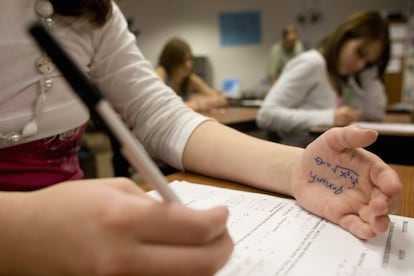I will not copy, I will not copy...
Experts point to an increase in dishonest academic practices The Public University of Navarre is bidding to promote a more ethical approach by introducing an obligatory pledge not to cheat

I hereby pledge not to use fraudulent means to obtain my degree at the Public University of Navarre." All the students at this higher education center will now have to sign this statement of academic honesty at the time of enrolment. This initiative, which is very common at North American universities and was already being contemplated by other Spanish campuses like Cantabria, is part of what Jaume Sureda and his research team call prevention measures against dishonest academic practices. They mean cheating. For those who persist there are detection measures and penalizations.
"Trends suggest that this type of behavior is on the rise," says Sureda, a professor at the University of the Balearic Islands. His most recent study found that 45 percent of university students admit to having copied someone else's work during written examinations, and over 60 percent have dabbled in some form of academic plagiarism in their papers.
Making matters more complicated is the fact that the good old-fashioned cheat sheets have become much more sophisticated with the advent of new technologies and the copy-paste option. And so the teacher's old surveillance system based on watchful walks up and down the aisles has also gotten an upgrade. In recent years, many university schools have been testing frequency inhibitors during exams to prevent students from seeking answers through their cellphones or other mobile devices.
I hereby pledge not to use fraudulent means to obtain my degree"
The School of Medicine and Dentistry at Valencia University tried out these inhibitors during the last academic year after some students complained about classmates using cellphones and earbuds to get help with their tests. "We bought one and got two more on loan. We warn students about it, and turn them off when exam periods are over," explains the school dean, Federico Pallardó. "Does it work? I think so, but we don't have any figures. Certainly, we've had no more complaints." Zaragoza University experimented with these devices years ago, but ultimately ruled them out. They believe it is enough to forbid mobile devices inside the classroom where the exam is going to be administered (a measure that is also enforced in Valencia).
So much for examination. It is very likely, however, that the biggest problem lies in plagiarism. Even politicians have been demoted for borrowing too heavily from others. Pál Schmitt was forced to resign as president of Hungary in 2012 after his doctoral dissertation was found to be a nearly literal translation of somebody else's work. Ex-German Defense Minister Karl-Theodor zu Guttenberg stepped down for similar reasons a year earlier.
"Although it is difficult to put a number on the cases of plagiarism in Spanish universities, it is a frequent problem, and I think it is neither new nor exclusive to our country," says Yolanda Morató, a professor at Seville's private Pablo de Olavide University. "The truth is, now plagiarism is easier than ever to detect. There are teachers who still do Google searches for sentences inside quotation marks. But with the learning platform WebCT, Blackboard offers a tool called SafeAssign, which gives instructors a report showing the percentage of text extracted from other sources."
Cheats: a gallery of shame
- Copying at one of the best universities in the world. Harvard, one of the most prestigious universities in the world, is not free of the problem, either. In a book written in the mid-2000s, a Harvard student named Eric Kester talked about an extended "copy culture." Last February, Harvard expelled 60 out of 125 students suspected of copying during a final examination. It was a test that could be taken home and turned in the next day, a very common practice at American universities. The answers from 125 of the 279 students were suspiciously similar.
- Fraud in dissertation leads to resignation. Former Hungarian president Pál Schmitt, former German Defense Minister Karl-Theodor zu Guttenberg, a onetime German education minister, Annette Schavan, and former Bundestag president Norbert Lammert all share something in common: they were forced to relinquish their posts in recent years after it emerged that they had plagiarized at least part of their doctoral dissertations. There are several websites in Germany where plagiarism hunters gather to unearth more cases.
- Bad practices in science. A study in the field of biomedicine in the US, published in Nature magazine in 2008, showed around 2,300 cases of possible mala praxis each year (from plagiarism to falsification) out of a group of 155,000 researchers. Very likely, the most famous recent case was that of South Korea's Hwang Woo-suk: in 2005 he announced in Science magazine that he had created revolutionary lines of embryonic stem cells, but months later it transpired that he had faked the results. In Spain, the most recent case involves Jesús Ángel Lemus, a veterinarian for the Spanish National Research Council (CSIC). Las year, its ethics committee established that 24 of the 36 studies he had participated in were "suspicious," either because of the incongruous data themselves, because laboratories he said he was working with rejected his claims, or because nobody was able to identify a mysterious collaborator who verified some of his work.
- Teachers who copy their students' work. In 2008, a faculty member at an Italian university was sentenced to seven months in prison and a compensation fee of 3,000 euros for two of his students, after it was proven that some of the chapters in a book he published had been copied from his own students' final career projects. In Spain, the Supreme Court recently sentenced a professor of mercantile law at Murcia University to pay 5,000 euros for plagiarizing a dissertation he had directed in a book he later published.
And this is just one of many tools - some free, others for pay — that have been developed to detect plagiarism. If the student sends in an assignment in electronic format, the program will automatically compare it with what's already been published online. "A paper with 60 to 70 percent of outside sources is a mere collection of quotes in the best of cases and a significant case of plagiarism in the worst. And it saves the teacher having to do internet searches for fragments of text. So now it is easier to plagiarize but it is also a lot easier to detect it," notes Morató.
However, these programs can also work the other way: to detect dishonest behavior by instructors and researchers. "It is necessary to guarantee students' copyright and establish formal complaint channels in case a professor is found to have plagiarized his students' papers or research work. This is especially true in the field of research. Right now students are not completely protected even though the Student Statute recognizes their intellectual rights to all their work. Universities must put in just as much work to ensure the faculty is aware of our rights, and enforce tougher sanctions," says Aratz Castro, spokeswoman for CREUP, a group that brings together student representatives from public universities.
Castro asserts that dishonest behavior, either in assignments or exams, "is few and far between," and that students are concerned that this problem might be overblown and the response too forceful as a result. "We are worried that any faculty member who suspects a student might have plagiarized work could take measures, and that would mean presuming him or her guilty until proven innocent, which is hardly legal. Professors should have clear proof that a student has committed fraud."
Other than that, CREUP considers that "any initiative that foments knowledge of one's rights and obligations is a positive thing; it is necessary to provide this kind of information, since many problems in the areas of teaching and student evaluation would be solved if both the faculty and the student body knew the rules," says Castro.
"It is obvious that they must not copy, and that doing so will have consequences, but [the pledges] are about reminding students that once they enter university they are considered adults who are responsible for their own actions, and that, as such, they are aware that they came here to learn," says a spokesman for the Public University of Navarre.
"It's also about encouraging a culture of ethics and deontology that is very much present in other countries, but which is sometimes not fully assimilated in Spain. This is implicit in American and Canadian universities, where students take their exams home and do them from one day to the next, or over the course of a few days, using as many sources as necessary, but always guaranteeing that their work will be original and not use fraudulent methods."
"I am afraid we're dealing with a cultural problem: if I can copy, I do, and nobody thinks the worse of me for it. Once a student told me most naively: 'Oh! So if I get caught copying there could be disciplinary proceedings against me?' Well of course! And you could get kicked out of university," recalls Federico Pallardó. The dean of Valencia's School of Medicine says Spain needs to encourage a culture of honesty and that is why he looks favorably upon the pledges of integrity. "We laugh a lot when we travel to the US and they ask us [in the customs forms] if we are planning to commit any crimes. But it's not pure nonsense," he adds.
I am afraid this is a cultural problem: if I can copy, I do"
Professor Morató agrees that, even if these initiatives do not guarantee that nobody will copy from others, "prevention is always better than having to fix something after the fact, and it reduces the number of cases since students will think twice if there are specific rules and control mechanisms in place." But Sureda, the researcher from the Balearics, misses clear, specific regulations on academic honesty. "I think it is a mistake not to adopt a systemic approach to academic honesty, choosing instead to implement isolated measures."
In a recent paper Sureda wrote about "the disparity, laxness and lack of transparency when it comes to establishing sanctions" at Spanish campuses. "The same fraudulent practice in one evaluation can mean a failing grade at one university, or taking the entire subject over again at another."
Despite several governments' attempts at updating the guidelines, Spanish universities are still ruled by regulations on discipline dating back to the 1950s — a time when Spain was ruled by Franco and universities were viewed by authorities as a constant source of trouble. Sureda insists that it is necessary to develop wide-ranging policies against academic dishonesty, including sanctions and preventive measures (like the pledges), as well as technology-driven detection methods.
Tu suscripción se está usando en otro dispositivo
¿Quieres añadir otro usuario a tu suscripción?
Si continúas leyendo en este dispositivo, no se podrá leer en el otro.
FlechaTu suscripción se está usando en otro dispositivo y solo puedes acceder a EL PAÍS desde un dispositivo a la vez.
Si quieres compartir tu cuenta, cambia tu suscripción a la modalidad Premium, así podrás añadir otro usuario. Cada uno accederá con su propia cuenta de email, lo que os permitirá personalizar vuestra experiencia en EL PAÍS.
¿Tienes una suscripción de empresa? Accede aquí para contratar más cuentas.
En el caso de no saber quién está usando tu cuenta, te recomendamos cambiar tu contraseña aquí.
Si decides continuar compartiendo tu cuenta, este mensaje se mostrará en tu dispositivo y en el de la otra persona que está usando tu cuenta de forma indefinida, afectando a tu experiencia de lectura. Puedes consultar aquí los términos y condiciones de la suscripción digital.









































